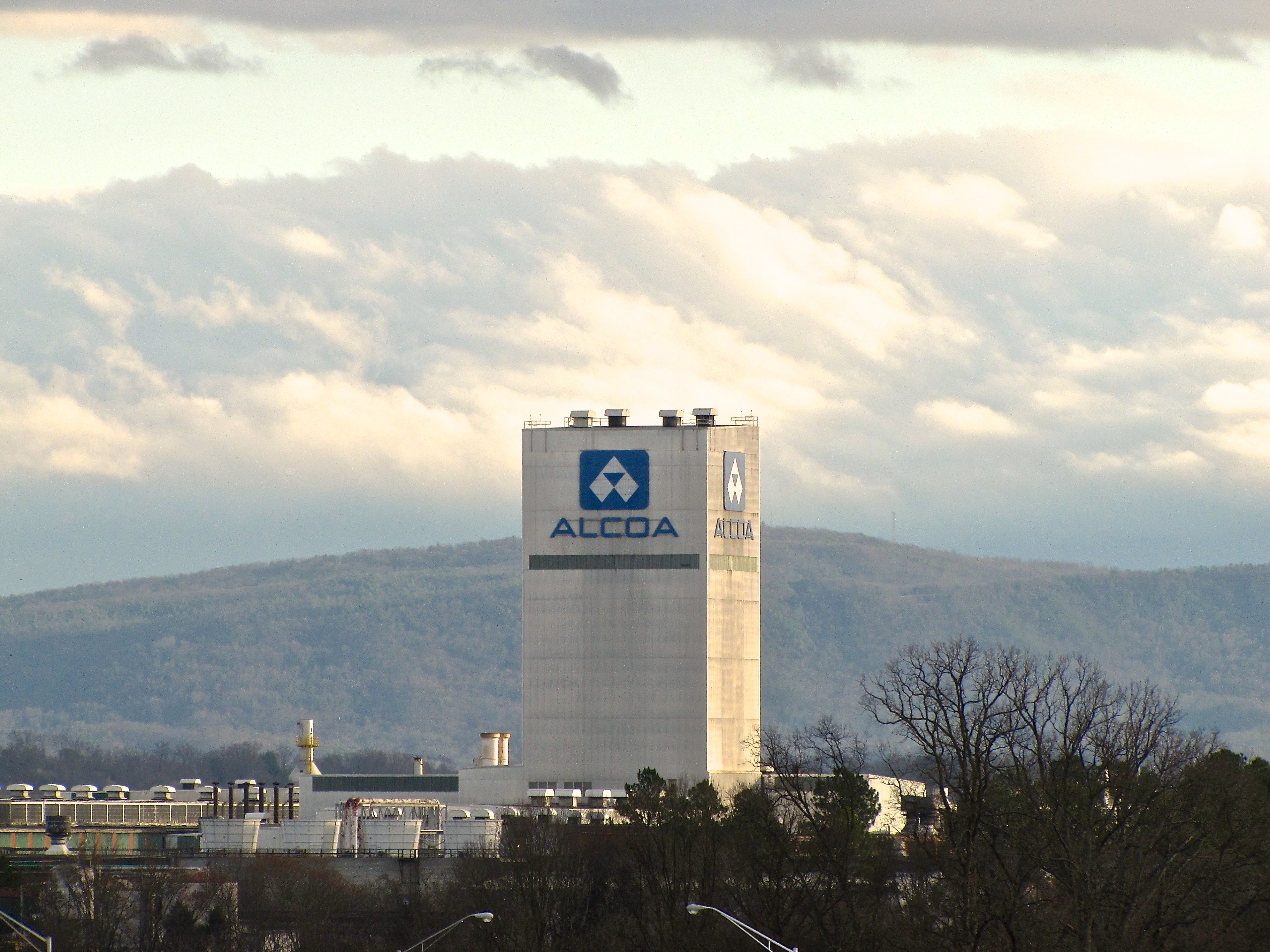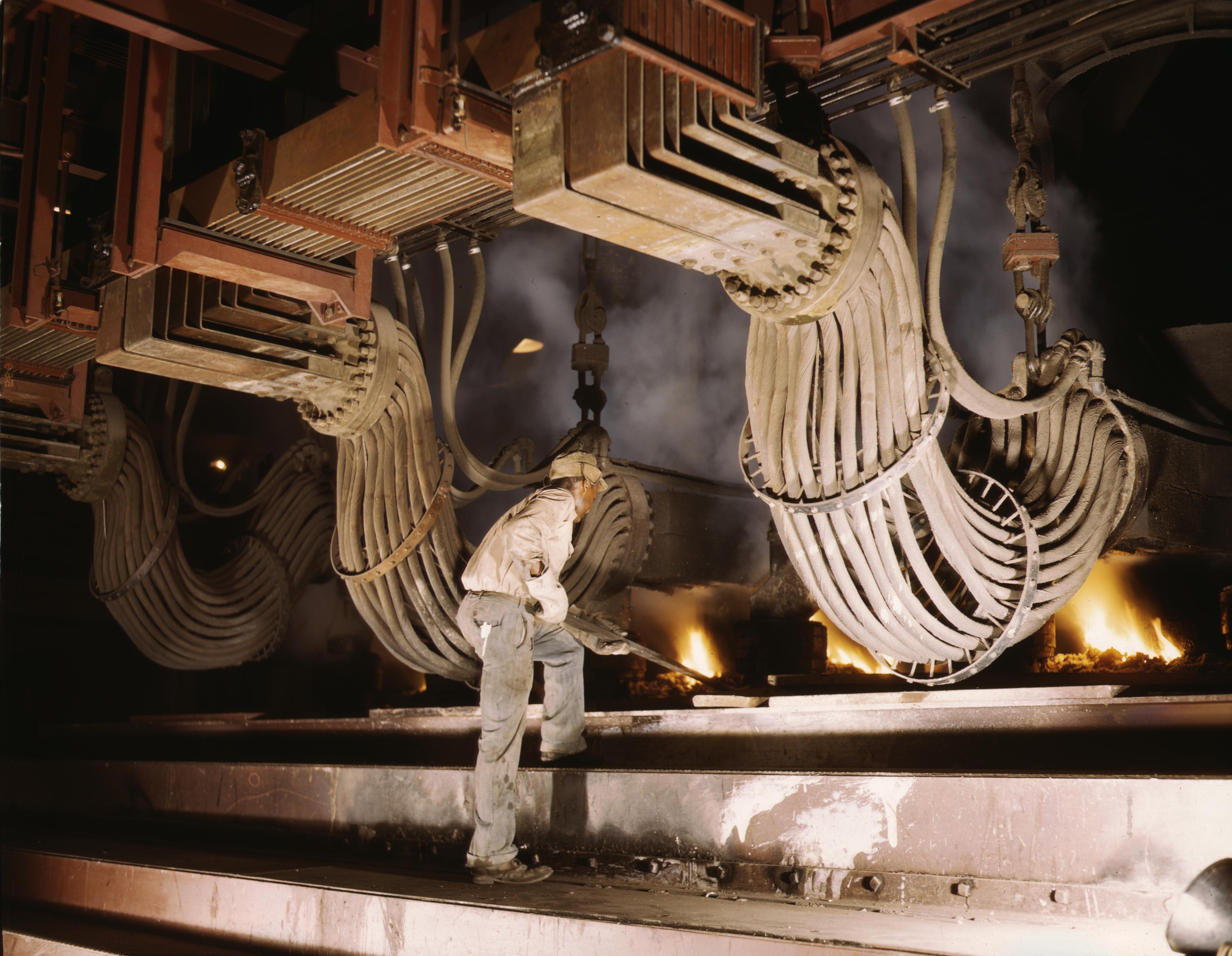|
Alcoa, Tennessee
Alcoa is a city in Blount County, Tennessee, United States. Its population was 10,978 at the 2020 census. It is part of the Knoxville, TN Metropolitan Statistical Area. As its name suggests, Alcoa was the site of a large aluminum smelting plant owned and operated by the Alcoa corporation (Aluminum Company of America). Formerly known as North Maryville, the town was incorporated under its present name in 1919. History Early company town Shortly after the Pittsburgh Reduction Company changed its name to the Aluminum Company of America in 1907, the company began investigating the possibility of establishing a large smelting operation in East Tennessee. The hydroelectric potential of the Little Tennessee River, which exits the mountains about southwest of Alcoa, was one of the primary incentives, as the company's aluminum smelting operation would require massive amounts of electricity. In 1910, the company established a base camp at what is now known as Calderwood, initially ... [...More Info...] [...Related Items...] OR: [Wikipedia] [Google] [Baidu] |
City
A city is a human settlement of a substantial size. The term "city" has different meanings around the world and in some places the settlement can be very small. Even where the term is limited to larger settlements, there is no universally agreed definition of the lower boundary for their size. In a narrower sense, a city can be defined as a permanent and Urban density, densely populated place with administratively defined boundaries whose members work primarily on non-agricultural tasks. Cities generally have extensive systems for housing, transportation, sanitation, Public utilities, utilities, land use, Manufacturing, production of goods, and communication. Their density facilitates interaction between people, government organisations, government organizations, and businesses, sometimes benefiting different parties in the process, such as improving the efficiency of goods and service distribution. Historically, city dwellers have been a small proportion of humanity overall, bu ... [...More Info...] [...Related Items...] OR: [Wikipedia] [Google] [Baidu] |
Smelting
Smelting is a process of applying heat and a chemical reducing agent to an ore to extract a desired base metal product. It is a form of extractive metallurgy that is used to obtain many metals such as iron-making, iron, copper extraction, copper, silver mining#Ore processing, silver, tin, lead smelting, lead and zinc smelting, zinc. Smelting uses heat and a chemical reducing agent to decompose the ore, driving off other elements as gases or slag and leaving the metal behind. The reducing agent is commonly a fossil-fuel source of carbon, such as carbon monoxide from incomplete combustion of coke (fuel), coke—or, in earlier times, of charcoal. The oxygen in the ore binds to carbon at high temperatures, as the Chemical energy, chemical potential energy of the bonds in carbon dioxide () is lower than that of the bonds in the ore. Sulfide ores such as those commonly used to obtain copper, zinc or lead, are roasting (metallurgy), roasted before smelting in order to convert the sulfid ... [...More Info...] [...Related Items...] OR: [Wikipedia] [Google] [Baidu] |
Labor Union
A trade union (British English) or labor union (American English), often simply referred to as a union, is an organization of workers whose purpose is to maintain or improve the conditions of their employment, such as attaining better wages and Employee benefits, benefits, improving Work (human activity), working conditions, improving safety standards, establishing complaint procedures, developing rules governing status of employees (rules governing promotions, just-cause conditions for termination) and protecting and increasing the bargaining power of workers. Trade unions typically fund their head office and legal team functions through regularly imposed fees called ''union dues''. The union representatives in the workforce are usually made up of workplace volunteers who are often appointed by members through internal democratic elections. The trade union, through an elected leadership and bargaining committee, bargains with the employer on behalf of its members, known as t ... [...More Info...] [...Related Items...] OR: [Wikipedia] [Google] [Baidu] |
New Deal
The New Deal was a series of wide-reaching economic, social, and political reforms enacted by President Franklin D. Roosevelt in the United States between 1933 and 1938, in response to the Great Depression in the United States, Great Depression, which had started in 1929. Roosevelt introduced the phrase upon accepting the Democratic Party (United States), Democratic Party's presidential nomination in 1932 before winning the election in a landslide over incumbent Herbert Hoover, whose administration was viewed by many as doing too little to help those affected. Roosevelt believed that the depression was caused by inherent market instability and too little demand per the Keynesian model of economics and that massive government intervention was necessary to stabilize and rationalize the economy. During First 100 days of the Franklin D. Roosevelt presidency, Roosevelt's first hundred days in office in 1933 until 1935, he introduced what historians refer to as the "First New Deal", ... [...More Info...] [...Related Items...] OR: [Wikipedia] [Google] [Baidu] |
Great Depression In The United States
In the United States, the Great Depression began with the Wall Street Crash of October 1929 and then spread worldwide. The nadir came in 1931–1933, and recovery came in 1940. The stock market crash marked the beginning of a decade of high unemployment, famine, poverty, low profits, deflation, plunging farm incomes, and lost opportunities for economic growth as well as for personal advancement. Altogether, there was a general loss of confidence in the economic future. The usual explanations include numerous factors, especially high consumer debt, ill-regulated markets that permitted overoptimistic loans by banks and investors, and the lack of high-growth new industries. These all interacted to create a downward economic spiral of reduced spending, falling confidence and lowered production. Industries that suffered the most included construction, shipping, mining, logging, and agriculture. Also hard hit was the manufacturing of durable goods like automobiles and appliances, w ... [...More Info...] [...Related Items...] OR: [Wikipedia] [Google] [Baidu] |
World War I
World War I or the First World War (28 July 1914 – 11 November 1918), also known as the Great War, was a World war, global conflict between two coalitions: the Allies of World War I, Allies (or Entente) and the Central Powers. Fighting took place mainly in European theatre of World War I, Europe and the Middle Eastern theatre of World War I, Middle East, as well as in parts of African theatre of World War I, Africa and the Asian and Pacific theatre of World War I, Asia-Pacific, and in Europe was characterised by trench warfare; the widespread use of Artillery of World War I, artillery, machine guns, and Chemical weapons in World War I, chemical weapons (gas); and the introductions of Tanks in World War I, tanks and Aviation in World War I, aircraft. World War I was one of the List of wars by death toll, deadliest conflicts in history, resulting in an estimated World War I casualties, 10 million military dead and more than 20 million wounded, plus some 10 million civilian de ... [...More Info...] [...Related Items...] OR: [Wikipedia] [Google] [Baidu] |
Racial Segregation
Racial segregation is the separation of people into race (human classification), racial or other Ethnicity, ethnic groups in daily life. Segregation can involve the spatial separation of the races, and mandatory use of different institutions, such as schools and hospitals by people of different races. Specifically, it may be applied to activities such as eating in restaurants, drinking from water fountains, using public toilets, attending schools, going to movie theaters, riding buses, renting or purchasing homes, renting hotel rooms, going to supermarkets, or attending places of worship. In addition, segregation often allows close contact between members of different racial or ethnic groups in social hierarchy, hierarchical situations, such as allowing a person of one race to work as a servant for a member of another race. Racial segregation has generally been outlawed worldwide. Segregation is defined by the European Commission against Racism and Intolerance as "the act by w ... [...More Info...] [...Related Items...] OR: [Wikipedia] [Google] [Baidu] |
Hall–Héroult Process
The Hall–Héroult process is the major industrial process for smelting aluminium. It involves dissolving aluminium oxide (alumina) (obtained most often from bauxite, aluminium's chief ore, through the Bayer process) in molten cryolite and electrolyzing the molten salt bath, typically in a purpose-built cell. The process conducted at an industrial scale, happens at 940–980 °C (1700 to 1800°F) and produces aluminium with a purity of 99.5-99.8%. Recycling aluminum, which does not require electrolysis, is thus not treated using this method. The Hall–Héroult process consumes substantial electrical energy, and its electrolysis stage can produce significant amounts of carbon dioxide if the electricity is generated from high-emission sources. Furthermore, the process generates fluorocarbon compounds as byproducts, contributing to both air pollution and climate change. Process Difficulties faced Elemental aluminium cannot be produced by the electrolysis of an aqueous ... [...More Info...] [...Related Items...] OR: [Wikipedia] [Google] [Baidu] |
Monroe County, Tennessee
Monroe County is a County (United States), county located on the eastern border of the U.S. state of Tennessee. As of the 2020 United States census, 2020 census, its population was 46,250. Its county seat is Madisonville, Tennessee, Madisonville, and its largest city is Sweetwater, Tennessee, Sweetwater. History During the early part of the 18th century, the area around what is now Monroe County was known as part of the traditional homelands of the Overhill Cherokee, a western subset of the Cherokee Nation (1794-1907), Cherokee Nation. They had established towns and villages extending through much of the mountainous areas of western Virginia, the Carolinas, southeastern Tennessee, and portions of northeastern Georgia and Alabama. English colonists and European Americans tended to refer to these areas by geography: Lower Towns, along the upper Savannah River in South Carolina; Middle Towns in Western North Carolina west of the French Broad River; and the Overhill Cherokee, Overhill ... [...More Info...] [...Related Items...] OR: [Wikipedia] [Google] [Baidu] |
Etowah, Tennessee
Etowah is a city in McMinn County in the U.S. state of Tennessee. The population was 3,613 at the 2020 census. History Etowah was founded in 1906, primarily as a location for a depot on the Louisville & Nashville Railroad (L&N) line as part of a more direct route between Atlanta and Cincinnati. The etymology of the town name is unclear, but local folklore states that a train crew brought a sign reading "Etowah" from the Etowah River, and the name stuck. The word Etowah comes from the Muskogee/Creek word ' meaning "town." In 1902, the Louisville and Nashville Railroad announced its plan to build a more direct line from Atlanta to Cincinnati in order to avoid the rugged mountains of North Georgia and East Tennessee bypassing the Great Hiwassee Loop. A point midway between these cities was needed to service cars and change crews, and at the end of 1904, land had been purchased in McMinn County to serve as this site and the city of Etowah was planned. The L & N purchased for th ... [...More Info...] [...Related Items...] OR: [Wikipedia] [Google] [Baidu] |
Knoxville, Tennessee
Knoxville is a city in Knox County, Tennessee, United States, and its county seat. It is located on the Tennessee River and had a population of 190,740 at the 2020 United States census. It is the largest city in the East Tennessee Grand Divisions of Tennessee, Grand Division and the state's List of municipalities in Tennessee, third-most populous city, after Nashville and Memphis, Tennessee, Memphis.U.S. Census Bureau2010 Census Interactive Population Search. Retrieved: December 20, 2011. It is the principal city of the Knoxville metropolitan area, which had a population of 879,773 in 2020. First settled in 1786, Knoxville was the first capital of Tennessee. The city struggled with geographic isolation throughout the early 19th century; the History of rail transportation in the United States#Early period (1826–1860), arrival of the railroad in 1855 led to an economic boom. The city was bitterly Tennessee in the American Civil War#Tennessee secedes, divided over the issue of sec ... [...More Info...] [...Related Items...] OR: [Wikipedia] [Google] [Baidu] |








